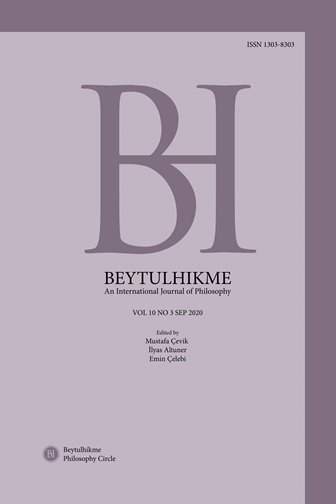Author :
Abstract
İbn Sînâ ve Hegel; kendi aralarında kültür, mekân ve zaman farklılıklarına sahipti. İlaveten İbn Sînâ Hegel’e nazaran daha Aristotelesçi tona sahip bir filozoftu. Tüm bu farklılıklar yine de iki filozofun devletin kurucu unsuru bağlamında müşterek öğretilere sahip olmasına engel olmadı. İbn Sînâ ve Hegel’in dini devlete temel yapma konusunda ne kadar benzeştikleri dikkate şayandır. İşin ilginci devletin kurucu un-suru bağlamında her iki filozofumuzun ayrıca aynı veyahut benzer işlevlere sahip kavram ve olgulara başvurmalarıdır. Bunlar arasında din, tin ve dünya tinini örnek olarak verebiliriz. İşin önemli bir tarafı her iki filozofta bu tarz kavram ve öğretileri beraber ele almalarıdır. Aslında İbn Sînâ ve Hegel tüm bu kavramsal öğretiler yoluyla bizatihi teolojik politik yapmaktaydılar. Zaten onlar nazarında insan hayvan-ı nâtık olmanın yanı sıra ve ötesinde hayvan-ı medenî idi. Bu yönüyle insan, her iki filozofuz için devletleşmiş varlıktır. Tüm bu öğretiler neticesinde İbn Sînâ ve Hegel’in benzer sonuçlara vardıkları da görülmelidir: Deizmin imkânını kapatma, dünyevi olanın tanrısallaştırılması, peygamberliğin devlet için elzem olması gibi.
Keywords
Abstract
Avicenna and Georg Wilhelm Friedrich Hegel had different cultures, spaces and times. In addition to these facts, Avicenna had a deeper Aristotelian impact upon his philosophy than Hegel. Still, all these different elements between the two philosophers were not an obstacle to grounding the state upon religion. It’s quite interesting how much Avicenna and Hegel resemble on grounding the state upon religion. Also, both philosophers apply to same or similar concepts and teachings in the context of grounding the state. We can give religion, spirit and the world spirit as examples to them. A very important side is that they tackle such concepts and teachings together with each other. Avicenna and Hegel actually did through these conceptual teachings essentially political theology. For both was the human being as zoon politikon also and more than zoon logikon. The human is a state-being in this aspect. Avicenna and Hegel reach similar results due to these teachings: As a refutation of deism, deifying of the secular and the necessity of the prophecy for the state.





